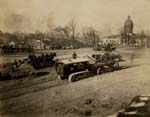This was a decade of contention about the place of Augustana College and Theological Seminary in the Augustana Synod. Since many subdivisions within the synod had their own colleges, they resented having to support Augustana College. Some congregations felt that having the Theological Seminary connected with Augustana College made the seminary less appealing to potential students. On campus, the need for new facilities was acute; Augustana had constructed only two buildings in the past 25 years. The college engaged campus planners and a team to study the educational situation and needs of the college and to provide guidance on its future. A successful fundraising campaign was undertaken to raise money for the endowment and needed facilities. The 1920s also saw a great upheaval in social activities, including the death of the two campus literary societies, among the oldest student groups at Augustana, and the rise of fraternities and sororities.
- 1920
- Institution of an honor system and a Student Council to supervise it. The system is only partially successful, as students are reluctant to inform on each other. The policy will be modified in 1927 to give more responsibility to instructors.
- October 16, 1920
- First annual homecoming celebration. The Observer promises "a brand of fall athletics that has never been excelled," and the Augustana football team defeats Illinois Wesleyan 28 to 10.
- October 23, 1920
- Augustana student Luther P. Kron is murdered in Galesburg on his way home from reporting on the Augustana-Milliken football game for the Observer. Kron is mistaken for a robber by plainclothes policemen and shot on his way to the train station. His funeral is held on October 27 and includes music by the Wennerberg Chorus, of which Kron had been a member. Kron's family will establish a scholarship in his name, which is still awarded to Augustana students.
- 1921
- Plans begin for separate seminary buildings on campus, partly as an answer to restive seminary faculty. It is hoped that with these new buildings the seminary will develop the identity of a graduate school not necessarily so closely connected to Augustana College. The new buildings will be located on Zion Hill.
- November 6, 1923
- Dedication of the new seminary buildings. Archbishop Nathan Söderblom of Sweden attends, bringing greetings from the King of Sweden. After sunrise services on Zion Hill, with President Andreen and the president of Gustavus Adolphus presiding, there is a full academic procession from Old Main to the new building. Over 2,000 people attend the dedication.
- May 1925
- Commercial department dissolves. The commercial department merges with the Augustana Academy, the high school equivalent attached to Augustana, and continues to offer courses in bookkeeping and shorthand. Some similar courses continue to be offered at the college level in the economics and commerce department.
- Fall 1928
- The Woman's Building is completed. The building is located on the north side of 7th Avenue and has space to house 135 women. Money covering over half the cost of the building was donated by the Women's Missionary Society, led by Emmy Carlsson Evald. The building will become a men's dormitory in the fall of 1960 and be renamed Carlsson Hall in honor of Erland Carlsson, first Chairman of Augustana's Board of Directors. Today the Woman's Building is called Emmy Carlsson Evald Hall in honor of the woman who led the campaign to fund its construction; it houses several academic departments.
- May 1928
- Augustana undertakes its first major fundraising campaign with the goal of raising $1,500,000 for the endowment and for the construction of new buildings.
- Fall 1929
- Augustana becomes the first Lutheran college to establish a department of geology. The department is under the direction of Professor Fritiof Fryxell, a graduate of Augustana College with a doctorate in geology from the University of Chicago.
- May 1929
- Jesse Routte is the first African-American to graduate from Augustana. He will enter the Augustana Seminary in the fall. Routte is well-known on campus as a gifted singer, and has given many lectures and concerts on campus and in area churches.



